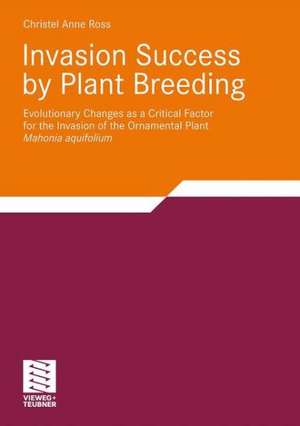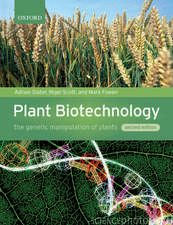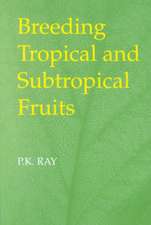Invasion Success by Plant Breeding: Evolutionary Changes as a Critical Factor for the Invasion of the Ornamental Plant Mahonia aquifolium
Autor Christel Rossen Limba Engleză Paperback – 26 feb 2009
Preț: 377.18 lei
Nou
Puncte Express: 566
Preț estimativ în valută:
72.18€ • 75.61$ • 59.82£
72.18€ • 75.61$ • 59.82£
Carte tipărită la comandă
Livrare economică 08-22 aprilie
Preluare comenzi: 021 569.72.76
Specificații
ISBN-13: 9783834807922
ISBN-10: 3834807923
Pagini: 124
Ilustrații: XVII, 105 p.
Dimensiuni: 148 x 210 x 7 mm
Greutate: 0.16 kg
Ediția:2009
Editura: Vieweg+Teubner Verlag
Colecția Vieweg+Teubner Verlag
Locul publicării:Wiesbaden, Germany
ISBN-10: 3834807923
Pagini: 124
Ilustrații: XVII, 105 p.
Dimensiuni: 148 x 210 x 7 mm
Greutate: 0.16 kg
Ediția:2009
Editura: Vieweg+Teubner Verlag
Colecția Vieweg+Teubner Verlag
Locul publicării:Wiesbaden, Germany
Public țintă
ResearchCuprins
Isolation and characterisation of microsatellite markers in the invasive shrub Mahonia aquifolium (Berberidaceae) and their applicability in related species.- Genetic relationships among three native North-American Mahonia species, invasive Mahonia populations from Europe, and commercial cultivars.- Invasive Mahonia plants outgrow their native relatives.- Mahonia invasions in different habitats: local adaptation or general-purpose genotypes?.
Notă biografică
Dr. Christel Anne Ross completed her doctoral thesis at the Department of Community Ecology at the Helmholtz-Centre for Environmental Research - UFZ in Halle, Germany. She now works as a junior editor in a specialist publishing house.
Textul de pe ultima copertă
Invasive species are a major threat to global biodiversity and cause significant economic costs. Studying biological invasions is both essential for preventing future invasions and is also useful in order to understand basic ecological processes.
Christel Ross investigates whether evolutionary changes by plant breeding are a relevant factor for the invasion success of Mahonia aquifolium in Germany. Her findings show that invasive populations differ from native populations in quantitative-genetic traits and molecular markers, whereas their genetic diversity is similar. She postulates that these evolutionary changes are rather a result of plant breeding, which includes interspecific hybridisation, than the result of a genetic bottleneck or the releases from specialist herbivores.
Christel Ross investigates whether evolutionary changes by plant breeding are a relevant factor for the invasion success of Mahonia aquifolium in Germany. Her findings show that invasive populations differ from native populations in quantitative-genetic traits and molecular markers, whereas their genetic diversity is similar. She postulates that these evolutionary changes are rather a result of plant breeding, which includes interspecific hybridisation, than the result of a genetic bottleneck or the releases from specialist herbivores.







